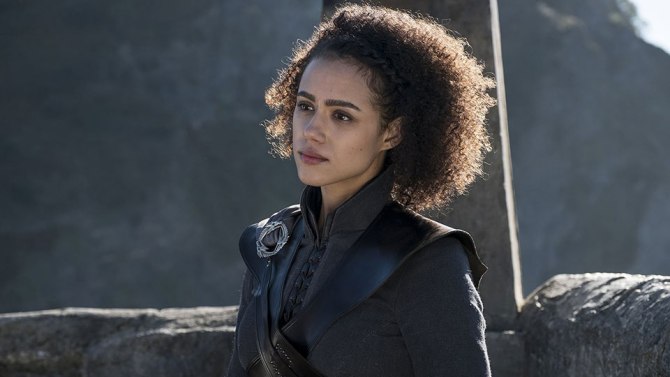Missandei did not make it to the series finale of Game of Thrones, but she’s left quite an impact as one of the series’ only main person of color. Nathalie Emmanuel’s reaction to Missandei’s GoT death is also about diversity and inclusion Emmanuel says that she expected women and women of color to identify with her character, but she was not prepared for the depths of the conversations that were sparked by the character’s brutal death.
Emmanuel told ET, “It sparked a conversation about representation and the treatment of actors of color, which I think is very welcomed. It should be had, absolutely.”
In episode four of the final season, Missandei is captured by Cersei (Lena Headey). After escaping as a slave, Missandei was yet again bound in chains and ordered to spill out any last words. She yells, “Dracarys,” and within moments she is beheaded by Cersei while her body flies off the top of the castle, bouncing down the side walls.
Here are a few responses from GoT viewers who found Missandei’s death a bit disturbing:
One fan wrote: “I’ll never forgive the GoT writers for making Missandei die in chains.”
Another Twitter user chimed in and said: “Missandei’s story is what happens when the writers can not imagine a world where Black characters are fully developed so…not surprised.”
And here’s what Ava DuVernay said about the fate of Missandei: “So… the one and only sister on the whole epic, years-long series? That’s what you wanna do? Okay.”
Image: HBO.
According to viewers, the killing of one of the few non-white characters was not the only issue. It was not just the fact that she died, but it was the way she was killed: enslaved. The frame on top of the castle begins with Missandei in chains after several seasons of her being free. It’s a setback, to say the least, which was a trigger for some fans who felt like the HBO series did not carefully develop the character’s fate. Emmanuel also told ET,
It’s something we can learn from going forward, about how we cast things, especially because it was a fantasy series. There’s fantasy, there’s so much more possibility. And … that way, if you try to cast as inclusively as possible, when the only one goes or is no longer in the show, there’s not so much of a heartbreak, because you feel represented throughout, as opposed to by just one person.
The representation for people of color in Game of Thrones rested on the shoulders of two main characters, Missandei (Nathalie Emmanuel) and Grey Worm (Jacob Anderson). Emmanuel’s point of view includes more diverse casting to avoid the feeling of an entire group of minorities being washed away when the only character representing them is killed.
Viewers become invested in characters for a plethora of reasons: skilled writing, intriguing characteristics, and representation. And though Emmanuel reflects positively on her role in the series, she tells ET, “I was given so much to do with Missandei over the course of the seasons that I was in, and the beautiful scenes and words that I got to say, like, and the kind of nuance of the scenes that I got to do was so amazing. But there is a wider issue of representation.”
When any star of a huge television series speaks out, the networks tend to seek improvement with the feedback in hand or are at least more careful when casting forward. Let’s stay tuned for how other shows and specifically fantasies will adhere to such a response from viewers.

